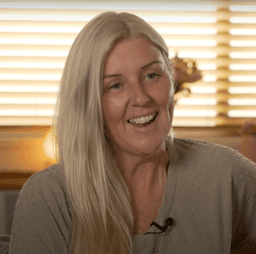How Angela Hartnett Built a Flexible FBA Empire from Her Living Room After Leaving 9-to-5

Business Description
Table of Contents
Navigate through the case study sections
Executive Summary
Case Study Content
From Fertility Struggles to Flourishing Online: Angela Hartnett's Ecommerce Reboot
Angela Hartnett had the kind of schedule most parents know well: unpredictable and often dictated by her family rather than a time clock. After fertility treatments and stepping away from her brick-and-mortar day job, she found herself at home, challenged by the dual responsibilities of raising kids and keeping her own ambitions alive. Not one to sit idle, Angela wanted to turn her time at home into something that could bring real income and a sense of achievement, but needed work that didn't get in the way of her kids. That's when she stumbled on the idea that would turn her days around: building and selling apps, and then, eCommerce brands online.
Discovering a New Marketplace
Angela began by developing children's mobile games and launching them through the Apple App Store. She noticed that, after the initial buzz of launch faded, her creations still held value. So she listed them on Flippa, the online marketplace for buying and selling digital businesses. To her surprise, the apps didn't just sell, they sold well. More than 40 apps later, the momentum carried her to explore bigger online ventures, catching her curiosity on how brands are built and sold on platforms beyond just the app world.
From Apps to Amazon: Seeing Value Beyond the Code
Selling digital products was one thing, but what about physical goods? Angela realized that Flippa wasn't just a platform for apps; it opened her eyes to the growing marketplace of eCommerce stores. Watching others list and profit from physical brands, she decided to try building her own. She turned to Amazon FBA (Fulfilled by Amazon), recognizing its built-in logistics and massive reach. Setting up shop, she started launching brands on Amazon and Shopify, using her previous experience as a digital seller to inform every step. Her knowledge of product launches and online marketing gave her an edge, but the Amazon FBA model let her skip the warehouse grind, she could take orders and manage operations from her kitchen table, with inventory handled by Amazon.
The Amazon FBA Model: Why It Worked for Angela
For Angela, flexibility was more than a bonus, it was the core requirement. The FBA model, where Amazon handles storage, packing, and shipping, freed her from daily physical demands. This allowed her to focus time on growing her brands, conducting market research, and developing new products, all while still being present for her children. She could tweak ad campaigns between school runs, answer supplier emails during nap time, and even brainstorm new ideas at the playground if she wanted.
Building Not One, But Three Brands
Angela didn't stop at a single product or store. With the infrastructure she’d set up, it made sense to replicate the process. Over time, she created three separate brands, all running under her management. Each had its own niche and set of loyal customers, but all were run with the same philosophy: efficient, home-based operations, digital-first marketing, and leveraging Amazon’s fulfillment. The brands’ specifics aren’t named, but strong reviews and consistent sales became the norm.
A Day in Her Shoes: Managing Family and FBA
Mornings start with the usual school drop-off. With the house quiet, Angela reviews her Amazon dashboards, answers supplier questions, checks inventory levels, and plans out any product launches. If she hits a snag (supplier delays, a batch of slow sales, or ad campaigns that aren't hitting), she handles them herself, learning to troubleshoot on the fly. After her business tasks, she returns to parenting, with evenings for socializing or downtime. This blend of work and family wouldn’t be possible in a traditional retail setting.
Scaling Up: What She Learned Along the Way
Mistakes happened, but Angela used them as quick lessons. Picking poor products, underestimating shipping delays, or misjudging early demand, she hit all these bumps. But her fast learning curve, experimenting, and use of Flippa to both buy and sell business assets kept her moving forward. She didn't just stop at Amazon, either. She also built an online presence using Shopify, giving her brands backup and additional sales outlets.
Flippa: Not Just a Marketplace, But a Launchpad
Through Flippa, Angela didn’t just sell her apps, she spotted opportunities to learn from other sellers, see what types of businesses buyers snapped up, and where value really lay in digital and physical brands. This ongoing market watching meant she was well ahead of average FBA sellers, picking up trends and pivoting when products stalled. As her confidence grew, so did her willingness to experiment even more with new niches.
Advice for Others: Don't Wait For the "Right Time"
Angela says the biggest roadblock isn’t money or ideas, it’s waiting around believing you need to be a "real business" first. She started with near-zero eCommerce experience, only her curiosity and patience for learning the ropes. Each sale, each new product, brought lessons she couldn't read in a guide. The main thing is to act: start, iterate, and keep moving even if kids are yelling, emails are arriving, and nothing’s perfect.
What Makes Angela's FBA Success Different?
It’s not flashy trophies or headline-grabbing numbers, but practical, repeatable success. She’s demonstrated how a solo founder, working from home, can build real, profitable brands that don’t need a warehouse, giant staff, or a VC investment. Angela’s approach is more about daily routine and gritty realism: build, test, update, repeat. It's not always glamorous, but the freedom, both with money and time, is real.
Where Next?
Angela looks forward to expanding her brands, leveraging her experience in identifying market gaps, and helping other entrepreneurs who want proof that it’s possible to run an eCommerce business alongside family life. She remains active in online seller communities, and is open about both her wins and mistakes. The lesson: it's possible to build something substantial from home, even in the imperfect chaos of family life, using modern digital tools and the right eCommerce models.
Key Takeaways
- 1Angela Hartnett transformed her life from a former app developer and stay-at-home mother into a successful full-time Amazon FBA entrepreneur.
- 2Leveraging Flippa’s marketplace, Angela discovered the potential value of eCommerce and applied lessons from digital product sales to physical goods.
- 3She launched, scaled, and manages three separate FBA brands using a remote, home-based business model to fit her family lifestyle.
- 4Her entire operation is bootstrapped, showing that you don’t need big funding or a team to succeed in online retail.
- 5Angela’s day-to-day success relies on effective use of Amazon FBA, Shopify, trend-watching, and continual adaptation to market needs.
- 6Her biggest advice: Don’t wait for ideal conditions, action, learning on the go, and using digital platforms can build real, profitable businesses.
Tools & Technologies Used
Premium Content Locked
Subscribe to access the tools and technologies used in this case study.
Unlock NowHow to Replicate This Success
Premium Content Locked
Subscribe to access the step-by-step replication guide for this case study.
Unlock NowInterested in Being Featured?
Share your success story with our community of entrepreneurs.
Explore More Case Studies
Discover other inspiring business success stories

How Mike Belasco Scaled Inflow to a $4M+ SEO Powerhouse and Sold It
Mike Belasco built Inflow from a one-man SEO sideline into a thriving, seven-figure e-commerce marketing agency. Over 17...
Inflow

How JustBeepIt Skyrocketed to $35,000 with Organic Traffic
JustBeepIt launched with zero marketing spend and climbed to $35,000 in sales by harnessing free channels: Product Hunt,...
JustBeepIt

From $100K Inventory Lockdown to a $1M Amazon Exit
Marwan Barakat turned a simple baby sunglasses brand into a seven-figure Amazon success story. Facing a patent ban on ha...
Baby Sunnies
